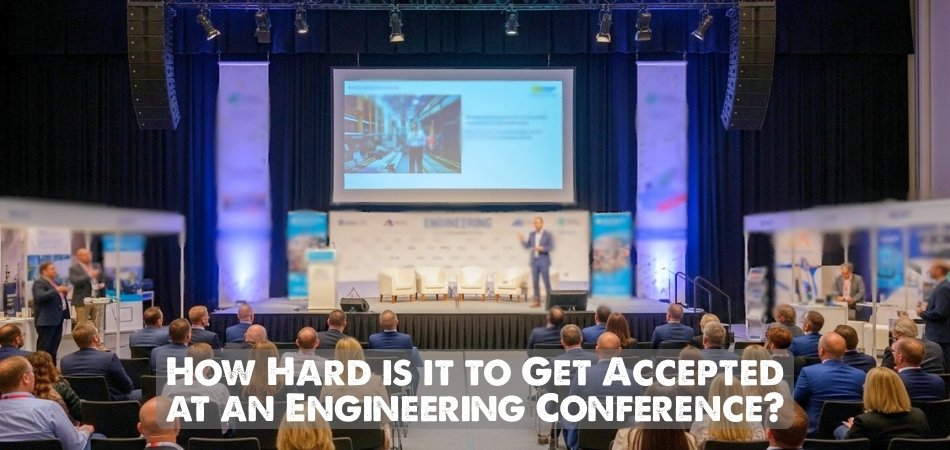As you must’ve guessed, it is not easy to get into an engineering conference. Many people try, but only a few are accepted. The process is strict, and the competition is strong. Your paper needs to really stand out.
So, how hard is it to get accepted at an engineering conference?
Getting accepted at an engineering conference is hard. Top conferences accept only 15% to 30% of full papers. Your chances improve if your paper is high quality, matches the topic, or is submitted to less competitive tracks like workshops. Top conferences are very selective and competitive.
Want to know how to improve your chances? Keep reading. This article will explain what you need to know and how you can give your paper the best shot.
How Hard is it to Get Accepted at an Engineering Conference?
Getting accepted at an engineering conference is different for everyone. Top conferences are very competitive and selective. Mid-tier conferences are easier, but still have some requirements. Workshops and poster sessions are usually more open and invite many to join. Here is a chart of the acceptance rate of various conferences and facts that affect the chances:
| Conference/Event | Acceptance Rate (%) | Notes |
| IEEE Major Conferences (2025) | 20–40 | Top-tier events, highly competitive |
| IEEE CVPR, NeurIPS (selective) | 10–15 | Most selective in engineering/AI |
| ACM RecSys (2024) | 22 | Recommender systems |
| ICSE (Software Engineering) | 15 | International, highly competitive |
| RE Conference (2012–2011) | 16–25 | Requirements Engineering |
| DAC (Design Automation) | 26 | Engineering track |
| Specialized Tracks/Workshops | 25–57 | Varies by track and event |
Understanding Conference Tiers
Reputable conferences, like those by IEEE or ACM, have low acceptance rates. They only accept about 15% to 30% of full papers. This makes it hard for most people to get in. Authors need strong research and clear writing.
Mid-tier or broad conferences are more welcoming. Acceptance rates can be as high as 40% to 60%. These events aim to include a wide range of voices. Academics, industry professionals, and students are all encouraged to submit.
The Role of Conference Focus
The focus area of a conference also matters a lot. Some conferences focus on new, advanced topics with fewer submissions. Others cover a wider range of subjects and get more papers.
When a conference focuses on popular topics, it can be harder to get accepted. Too many submissions mean tougher competition. Niche conferences sometimes make it easier to stand out. Knowing the theme helps you choose wisely.
Submission Types: Full Papers, Workshops, and Posters
Full paper submissions face the hardest review process. Only the best research usually gets through. For example, the most selective conferences may only take one out of five papers.
Workshops, poster sessions, and doctoral symposia are easier options. Acceptance rates here are often 50% or more. These formats are less formal and more about sharing ideas. Many newcomers start with these before trying full papers.
Conference Locations and Acceptance Trends
The country hosting a conference can affect the application process. For example, conferences in USA, Germany, or Japan often receive many international papers. These places are home to respected universities and research groups.
However, there are also great events in other countries with varying acceptance rates. Some conferences abroad may be less competitive. This means you might have better odds. Always check the acceptance history before you submit.
What Are the Common Reasons for Rejection?
Getting a paper rejected can feel really disappointing. But it often happens for clear and fixable reasons. Reviewers check each paper closely before deciding. Let’s look at some common things that can lead to rejection.
No New Idea
If your paper repeats something already done, it may not get accepted. Reviewers want fresh and useful ideas. Even a small new twist can help, but it must be clear. Just changing a few words from other work is not enough. Try to bring something different that adds value.
Technical Mistakes
Papers with mistakes in data, methods, or results are likely to be rejected. Reviewers check if everything is done correctly. If no numbers match or tests are missing, that’s a big problem. Make sure your work is tested and makes sense. Checking your work more than once really helps.
Hard to Read
A paper with messy writing or poor structure can confuse the reviewer. If they can’t understand your point, they won’t accept it. Use simple words and short sentences. Make sure ideas are in the right order. A clean paper is much easier to read and review.
Off-Topic Work
If your paper doesn’t match the conference topic, it might be rejected right away. Even good work needs to fit the event. Always read what the conference is asking for. Try to match your topic with the right session. This shows that you read the instructions carefully.
Copied Content
Using someone else’s work without saying where it came from is called plagiarism. Reviewers take this very seriously. If they find copied content, your paper will be rejected. Always write in your own words and give credit when needed. Honest work builds real respect.
Too Much Promotion
If your paper sounds like an ad, reviewers won’t like it. They are not looking for product sales. Research should teach something, not promote a company or item. Focus on facts, results, and learning. Keep your paper professional and clear of ads.
What Influences Acceptance Difficulty?
It’s not just about writing a paper to get into an engineering conference. Several key factors influence your chances of acceptance. That’s why it’s important to understand what matters most, so you can prepare effectively and target the right conferences. Here are the facts you need to know:
Conference Prestige and Selectivity
- Prestigious conferences usually have low acceptance rates, sometimes below 30%, making the process much more competitive. These events attract top researchers who submit their strongest, well-polished papers.
- Reputation plays a big role—top-tier conferences are seen as platforms for excellent research and major scientific progress. This increases the level of competition for every submission.
Quality and Novelty of Submission
- Reviewers look for new ideas that add something meaningful to the field, not just repeat old findings. If your research offers something unique and useful, your chances of acceptance will be higher.
- Well-written papers with clear methods and strong results perform better in review. Clarity helps reviewers quickly understand your key points.
Field and Topic Popularity
- Popular research areas attract more submissions, which raises the difficulty of acceptance due to sheer volume. Hot topics like AI or green energy often face tough competition.
- Less crowded fields can make it easier to stand out, especially if your work fills a knowledge gap. Choosing your topic wisely can improve your chances.
Conference Size and Scope
- Large conferences may accept more total papers, but the number of submissions is also much higher. This balance means competition stays high even if there are more sessions.
- Smaller events often focus on niche areas, which may raise your chances if your research is highly specific. These conferences look for deep, focused studies.
Review Process and Committee Structure
- Conferences with big review committees can evaluate more papers, but that doesn’t always mean easier acceptance. They might still use strict review rules to ensure quality.
- Some conferences use a two-stage review process for better accuracy, but it adds more checks. This can make the process longer and tougher.
Conference Ranking and Impact
- Higher-ranked conferences are more likely to receive submissions from leading researchers. That adds pressure and lowers your odds unless your work is strong.
- Impact factor affects the audience reach, so people aim high. But aiming high also means more intense scrutiny from reviewers.
Location and Participation Trends
- Countries like the USA, Germany, and Japan host many top engineering conferences every year. These tend to receive global submissions, raising competition.
- If you’re planning to register for an engineering conference in the USA, make sure your work is well-aligned with the topic. High interest in these events means you must submit your best research.
What Engineering Conference Reviewers Look For While Accepting?
Ever wonder what makes a research paper get accepted at an engineering conference? It’s not all about big words or fancy topics. Reviewers look for certain things that help them choose the best papers. Let’s break it down in a way that’s easy to understand.
| Criterion | Description |
| Originality | New ideas, methods, or applications |
| Technical Quality | Sound methodology, correct results |
| Significance | Importance and impact on the field |
| Relevance | Fit with conference theme and audience |
| Clarity | Clear writing, logical structure |
| References | Quality and relevance of citations |
Core Evaluation Criteria
Engineering conference reviewers assess submissions based on several key factors:
-
Originality and Novelty
-
-
- Does the paper present new methods, concepts, or applications?
- Is the work a significant improvement or a novel application of existing methods?
-
-
Technical Quality and Correctness
-
-
- Are the methods and results technically sound and well-validated?
- Is the research methodology appropriate and reliable?
-
-
Significance and Impact
-
-
- Does the work address an important problem in the field?
- What is the potential impact or contribution to the engineering community?
-
-
Relevance
-
-
- Is the paper relevant to the conference’s theme and audience?
- Does it align with the specific track or session to which it was submitted?
-
-
Clarity and Organization
-
-
- Is the paper well-written, clear, and logically organized?
- Are the arguments and results presented in a coherent manner?
-
-
Quality of Presentation
-
-
- Are figures, tables, and references used effectively?
- Is the English language clear and correct?
-
-
References
-
- Are the cited sources relevant, current, and diverse?
- Do the references support the claims and context of the work?
Typical Review Process
-
Summary and Recommendation
-
-
- Reviewers summarize the main contribution and provide a recommendation (accept, revise, or reject), justifying their decision based on the above criteria.
-
-
Strengths and Weaknesses
-
-
- Each review highlights both the strengths (e.g., novelty, strong results) and weaknesses (e.g., unclear explanations, missing references) of the submission.
-
-
Constructive Feedback
-
- Reviewers are expected to provide specific, actionable suggestions to help authors improve their work, regardless of the acceptance decision.
Reviewer Ethics and Responsibilities
-
Objectivity and Confidentiality
-
-
- Reviews must be unbiased and confidential.
- Reviewers should recuse themselves in cases of conflict of interest.
-
-
Professionalism
-
- Feedback should be professional, courteous, and focused on the work, not the author.
Are There Specific Strategies to Improve Your Chances of Acceptance?
Yes, there are! Getting your paper accepted isn’t just about writing—how you prepare matters a lot too. Following smart strategies can improve your chances in a big way. From choosing the right topic to careful editing, each step plays a role.
Read the Guidelines
Every conference has its own rules and format. Follow word limits, file type, citation style, and submission deadline. Missing a rule can lead to early rejection. Reading everything first saves time and avoids big mistakes.
Pick the Right Topic
A strong topic fits the theme and feels fresh. Reviewers notice when your paper fits the current trends. Avoid old or overdone ideas that add little. Think about what problems are still unsolved or underexplored.
Make Your Research Count
Your paper should offer new and important results. Avoid copying or slightly changing other people’s work. Show how your idea solves something hard or overlooked. Strong results always help you stand out.
Write a Strong Beginning
A good abstract tells what the paper does and why it matters. Keep it short, clear, and catchy. Your introduction should explain the problem and the solution clearly. The first part of your paper builds the first impression.
Show Methods and Results Clearly
Explain your steps so readers understand how you did the work. Use charts and tables to show your findings. Good layout and clear data help people trust your work. Don’t leave out important parts of the process.
Explain What It Means
Talk about what your results show and why they matter. Compare with other research and note what’s different. Point out any limits in your work honestly. Suggest where the research can go next.
Edit Before You Submit
Fix grammar, spelling, and formatting issues before you send the paper. Mistakes make your work seem rushed. Ask others to read and give feedback. Careful editing shows that you respect the reader’s time.
Know What Reviewers Want
Look at papers accepted in past years. See how they’re written and what makes them strong. Reviewers like papers with clear goals and good results. This also helps when you prepare for an engineering conference with high standards.
Start Early, Accept Help
Work on your paper weeks before the deadline. Rushing at the last minute weakens the quality. Let friends or teachers read your early drafts. Use their comments to make your paper better.
FAQs About Difficulties of Getting Accepted at an Engineering Conference
Getting accepted at an engineering conference can be challenging, especially for first-time authors. Many factors affect your chances, including topic, writing, and conference level. Below are 7 relevant FAQs to help you better understand the process.
What Is the Best Time to Start Working on a Conference Paper?
It’s best to start at least 2–3 months before the deadline. This gives you time to plan, write, revise, and collect feedback. Rushing often leads to mistakes or weak results. A good paper takes time, review, and careful editing.
Do Student Papers Get Rejected More Often?
Not necessarily. Reviewers focus on the quality and relevance of the paper, not the author’s experience level. If your work is well-written, original, and matches the conference theme, it can be accepted even if you’re a student.
How Important Is the Title of the Paper?
The title is the first thing reviewers and readers see, so it matters a lot. A clear, catchy title helps grab attention and sets the right tone. It should reflect your main idea without being too long or confusing.
Does Collaborating With a Senior Researcher Improve Acceptance Chances?
Working with experienced researchers can strengthen your paper. They often guide the research design and review the writing. However, collaboration doesn’t guarantee acceptance—your paper still needs to meet all quality and relevance standards set by the conference.
Can I Resubmit a Rejected Paper to Another Conference?
Yes, you can. But first, improve the paper based on reviewer feedback. Fix weak areas, improve writing, and check if it fits the new conference better. Many good papers get accepted after being improved and submitted to a different event.
How Many Conferences Should I Apply to at Once?
It’s best to focus on one conference per paper. Most conferences don’t allow duplicate submissions. Choose the one that fits your topic and goals the best. Quality matters more than quantity when it comes to academic paper submissions.
Do All Conference Tracks Have the Same Acceptance Difficulty?
No, different tracks have different levels of competition. Main research tracks are usually harder to get into. Workshops, poster sessions, or student forums often have higher acceptance rates and are great options for early-stage or ongoing research.
Final Thoughts
To attend an engineering conference, you must apply. You need to work hard and plan everything well. Your topic must be strong, and your writing must be clear. Many people apply, but only a few are chosen. That’s why it helps to understand how hard is it to get accepted at an engineering conference before you send your paper.
If you avoid common mistakes and follow the rules, your chances improve. Even if you don’t get in the first time, keep trying. Every try makes you better. Believe in your work and stay focused—you can do it.








